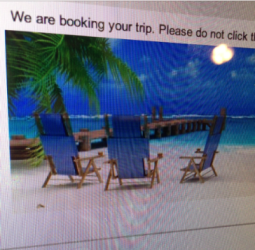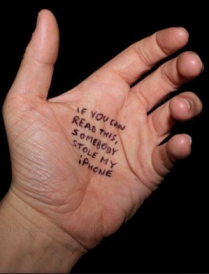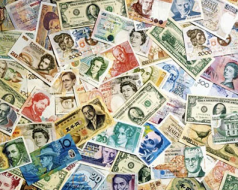“YOUR TRIP IS RIGHT AROUND THE CORNER” was the subject line of a recent e-mail from the company I booked my flights through. As calendar pages flipped relentlessly from future to present to past, I’ve somehow made it to only about a month away from my departure date. 
Now the big question has grown into, “Are you excited?”
I’m pretty certain the answer is yes, thrilled! And somewhat in denial, definitely increasingly anxious, but mostly too stressed about all the dots I have left to connect before it starts to even click that I’m leaving soon.
With technically 26 days until my flight, here are the items every international traveler should consider when they’re in the home stretch…
PASSPORT
A passport with several unstamped pages and at least six months until its expiration should be applied for at least two months in advance. That’s playing it safe, but no one wants to take risks in this department. At a minimum, anticipate four weeks of processing before you’ll have it finally delivered to you in the mail. 
Already have one? Make sure you have several extra pages, some countries require at least two are blank before you can apply for a visiting visa.
VISAS
Always check ahead if the place you’re flying into or visiting throughout your travels requires a visa. The US Department of State website details which countries require one, what type a traveler needs to apply for, and details on what the process entails. It can be easy, or a burning hole in your wallet and headache.
 When traveling to Australia for a student semester abroad, applying for a visa took about 20 minutes of filling out information online and a fee. Get comfortable with fees, they’re everywhere. That visa was a simple process and conveniently attached to my passport electronically.
When traveling to Australia for a student semester abroad, applying for a visa took about 20 minutes of filling out information online and a fee. Get comfortable with fees, they’re everywhere. That visa was a simple process and conveniently attached to my passport electronically.
This time I have the lovely experience that is applying for a tourist visa to Brazil. If you live near your jurisdiction’s consulate, Monday through Friday there is typically a two-hour window open to apply for your visa in person. If not, check the specifications your jurisdiction’s consulate requires for through-the-mail applications.
For example: Brazil.
My I.D. is licensed from Pennsylvania which is a state that falls in the New York consulate’s jurisdiction. A Brazil visa costs $165 USD as a reciprocated fee for what we ask of Brazilians who visit the US. The NY bureau requires an applicant to either have a family member or friend apply for them in person, otherwise, a third party company must be used to transfer the documents.
So, I had to:
- Complete the consulate’s online visa documents (Print and sign TWO copies)
- Fill out the third party’s online information (I used Travisa)
- Figure out what an airbill is
- Scream into a pillow, then fork over $300*
- Fortunately find a recent passport photo to include (1 required)
- Scan a copy of my I.D.
- Print proof of my departure via flight plans
- Triple check I wasn’t forgetting anything
And send it all off through FedEx with fingers crossed that the visa is accepted and passport returned! In hindsight, do this three months in advance to avoid an onslaught of panic attacks.
*Dollar break-down: $165 for the consulate fee, $20 consulate handling fee, $65 for Travisa, $27 each way for overnight shipping fees.
TRAVEL INSURANCE 
I would definitely prefer not to pay another couple of hundred dollars when I’m already on a tight budget, but travel insurance is a non-negotiator. All it takes is one accident to land you in an unforeseeable situation made infinitely worse because you chose to pass on this purchase.
Get a quote from World Nomads in less than a minute and see how they specifically cover your trip from baggage and trip interruptions, to medical expenses and evacuation. For a six-month trip, I’m anticipating $300 to go towards travel insurance.
CELL PHONE
Whether or not you decide to take a cell phone should be considered seriously. There is always a good chance that it will be lost, broken or stolen. In fact, count on it and be happily surprised if it ends up fine!

If you’re going to be in one location for an extensive period of time (1 month or longer), I’d advise a pay-as-you-go phone. They don’t offer all the amenities your very first flip phone did, but they are inexpensive and easy to refill minutes per week, month, or as you need them.
Since I will be crossing borders unpredictably and often, I am planning to visit my service carrier to have my personal phone unlocked. This means that I’ll be able to purchase a global SIM card through which I’ll pay for data as I go.
Ideally, you can switch your plan to an international one. But if you choose that option, don’t be surprised by some serious monthly bills.
SHOTS, SHOTS, SHOTS!
And not the fun kind. If you’re going to need a series of vaccinations, schedule a visit to your local doctor, student health center or travel-specific physician well in advance. Otherwise, it’s recommended you do so about 30 days before your departure. Go onto the CDC Traveler’s Health Website to look up every country you’ll be traveling to and see which shots you should anticipate getting.
Check back in a week for an update more specifically on which shots I received and how much it cost! I distinctly remember two nurses holding me down while I screamed and cried as a child receiving one let alone an hour’s worth, so this should go well.
PACKING

One backpack less than 50 lbs…should be easy, right? As someone who packs for a weekend like I’ll be gone for weeks, this is going to take some planning.
It can’t hurt to start a list on your phone, computer or a day planner early in the game. Write down items as you think of them, and check around the web for ideas. Packing is a popular topic and almost certainly going to have its own write-up on every traveler blogger’s site.
Additionally, explore the nearby travel focused clothing stores. Sure, REI and Patagonia will have the overpriced, unnecessary items they’ll try to convince you you’ll die without, but they’ll also have great ideas and useful information you probably wouldn’t think of otherwise.
BANKING
Make sure to alert your bank(s) that you’re hitting the road soon! Forget to do this and good luck getting your card to work. Even thought the security measures are to protect your own account, they can be extremely frustrating when it’s you they’re unknowingly protecting against.
Consider bringing a back up card with you connected to another account. If one gets compromised, it can take a few days for a new card to be issued and delivered. Also, leave your banking information with someone you trust in case you should need help accessing your account, transferring or wiring money, etc. 
Which bank should you use as a traveler? I’ll be opening a checking account with Charles Schwab. There’s no deposit minimum requirement, annual fees or exchange rate for overseas charges. Even better: every month you’re reimbursed for the ATM fees you pay.
The stress list is definitely not a glamorous side of long-term, long-distance traveling, but it’s important. Overlooking or ignoring any of the bullets mentioned will almost certainly land you not only in a foreign country, but a logistical mess. You want to enjoy your trip, don’t cut corners and get it done! Peace of mind and smoother sailing are around the corner.


Good advice…shouldnt you also let the State Dept know what countries u will be in? That is dadthink…
Sent from my Windows Phone ________________________________
This post just made me want to book a trip asap! Last year at this time I was doing all of these things for Costa Rica. Hope you have a great trip!
Thanks, Kelsey! Still can’t really believe it’s happening, but I can’t wait!
Hi Chelsea, the big trip is almost here! I am so excited for you. As I already mentioned, I love South America, especially Brazil.
Here are a few last minute tips:
1. Pack light. Lighter than light even. Just think, anything you could possibly need you could buy there. Besides, do you really want to lug around hiking boots and a thick jacket while you’re enjoying the beaches of Brazil? Seriously, save your back and pack light.
2. Don’t bring anything expensive or that you wouldn’t want to lose or leave somewhere. Going back to tip #1, once you don’t need that thick jacket anymore you may want to consider donating it or leaving it at a hostel for someone else to use.
3. Watch your drinks! My very first night in SA a guy told me a story about someone putting something in his drink and waking up the next morning on a bus stop. Just a reminder to take the same type of precautions you would at home in the States.
4. As far as banking goes, a good thing to do is to transfer money on a monthly basis to the account you will be using during your travels, while keeping the rest of your funds in a separate account. This way if for some reason someone gets access to your banking details, they won’t have access to all of your funds. Although banks have a great fraud protection system, it usually takes a few irregular charges before they freeze an account.
5. Buy local clothes. If you’re traveling alone, especially as a girl, it doesn’t hurt to try to blend in. While in South America I bought all local, inexpensive clothes-just a few pieces at a time. Wearing them for a month or two then donating them and buying more things. I only brought 17 lbs with me so I could only have 5 to 10 pieces of clothing at a time but it made traveling so much easier.
Hope you find some of this info helpful. Take lots of pictures and have a wonderful trip!
Thank you so much for all your advice, Renee! Sorry for the late reply — responding to your email now. Really great points I will be taking to heart.